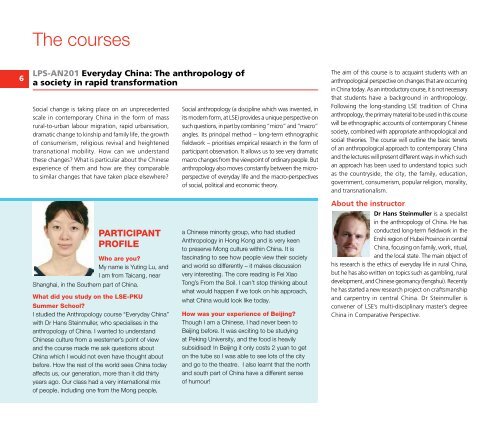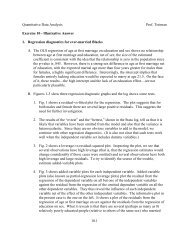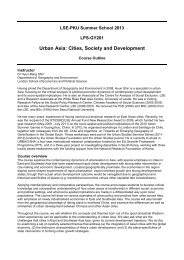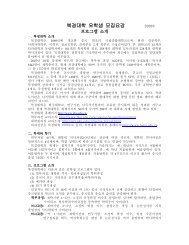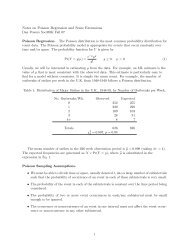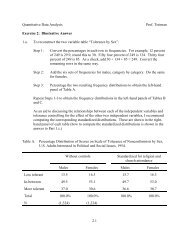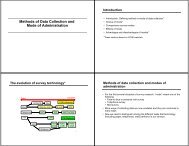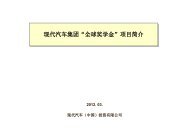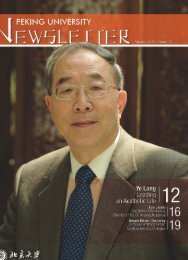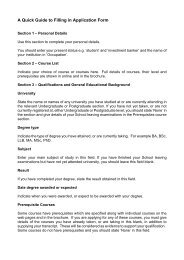LSE-PKU Summer School 2013 Brochure
LSE-PKU Summer School 2013 Brochure
LSE-PKU Summer School 2013 Brochure
You also want an ePaper? Increase the reach of your titles
YUMPU automatically turns print PDFs into web optimized ePapers that Google loves.
The courses<br />
6<br />
LPS-AN201 Everyday China: The anthropology of<br />
a society in rapid transformation<br />
Social change is taking place on an unprecedented<br />
scale in contemporary China in the form of mass<br />
rural-to-urban labour migration, rapid urbanisation,<br />
dramatic change to kinship and family life, the growth<br />
of consumerism, religious revival and heightened<br />
transnational mobility. How can we understand<br />
these changes What is particular about the Chinese<br />
experience of them and how are they comparable<br />
to similar changes that have taken place elsewhere<br />
Social anthropology (a discipline which was invented, in<br />
its modern form, at <strong>LSE</strong>) provides a unique perspective on<br />
such questions, in part by combining “micro” and “macro”<br />
angles. Its principal method – long-term ethnographic<br />
fieldwork – prioritises empirical research in the form of<br />
participant observation. It allows us to see very dramatic<br />
macro changes from the viewpoint of ordinary people. But<br />
anthropology also moves constantly between the microperspective<br />
of everyday life and the macro-perspectives<br />
of social, political and economic theory.<br />
The aim of this course is to acquaint students with an<br />
anthropological perspective on changes that are occurring<br />
in China today. As an introductory course, it is not necessary<br />
that students have a background in anthropology.<br />
Following the long-standing <strong>LSE</strong> tradition of China<br />
anthropology, the primary material to be used in this course<br />
will be ethnographic accounts of contemporary Chinese<br />
society, combined with appropriate anthropological and<br />
social theories. The course will outline the basic tenets<br />
of an anthropological approach to contemporary China<br />
and the lectures will present different ways in which such<br />
an approach has been used to understand topics such<br />
as the countryside, the city, the family, education,<br />
government, consumerism, popular religion, morality,<br />
and transnationalism.<br />
PARTICIPANT<br />
PROFILE<br />
Who are you<br />
My name is Yuting Lu, and<br />
I am from Taicang, near<br />
Shanghai, in the Southern part of China.<br />
What did you study on the <strong>LSE</strong>-<strong>PKU</strong><br />
<strong>Summer</strong> <strong>School</strong><br />
I studied the Anthropology course “Everyday China”<br />
with Dr Hans Steinmuller, who specialises in the<br />
anthropology of China. I wanted to understand<br />
Chinese culture from a westerner’s point of view<br />
and the course made me ask questions about<br />
China which I would not even have thought about<br />
before. How the rest of the world sees China today<br />
affects us, our generation, more than it did thirty<br />
years ago. Our class had a very international mix<br />
of people, including one from the Mong people,<br />
a Chinese minority group, who had studied<br />
Anthropology in Hong Kong and is very keen<br />
to preserve Mong culture within China. It is<br />
fascinating to see how people view their society<br />
and world so differently – it makes discussion<br />
very interesting. The core reading is Fei Xiao<br />
Tong’s From the Soil. I can’t stop thinking about<br />
what would happen if we took on his approach,<br />
what China would look like today.<br />
How was your experience of Beijing<br />
Though I am a Chinese, I had never been to<br />
Beijing before. It was exciting to be studying<br />
at Peking University, and the food is heavily<br />
subsidised! In Beijing it only costs 2 yuan to get<br />
on the tube so I was able to see lots of the city<br />
and go to the theatre. I also learnt that the north<br />
and south part of China have a different sense<br />
of humour!<br />
About the instructor<br />
Dr Hans Steinmuller is a specialist<br />
in the anthropology of China. He has<br />
conducted long-term fieldwork in the<br />
Enshi region of Hubei Province in central<br />
China, focusing on family, work, ritual,<br />
and the local state. The main object of<br />
his research is the ethics of everyday life in rural China,<br />
but he has also written on topics such as gambling, rural<br />
development, and Chinese geomancy (fengshui). Recently<br />
he has started a new research project on craftsmanship<br />
and carpentry in central China. Dr Steinmuller is<br />
convener of <strong>LSE</strong>’s multi-disciplinary master’s degree<br />
China in Comparative Perspective.


